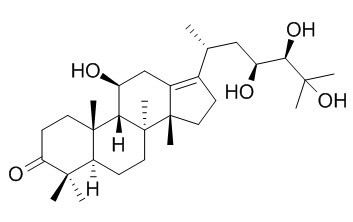Alisol A
Alisol A may be an autophagic inducer, it has anti-cancer activity, it presents inhibitory effects on cancer cell lines tested(HepG2, MDA-MB-231, and MCF-7 cells).
Inquire / Order:
manager@chemfaces.com
Technical Inquiries:
service@chemfaces.com
Tel:
+86-27-84237783
Fax:
+86-27-84254680
Address:
1 Building, No. 83, CheCheng Rd., Wuhan Economic and Technological Development Zone, Wuhan, Hubei 430056, PRC
Providing storage is as stated on the product vial and the vial is kept tightly sealed, the product can be stored for up to
24 months(2-8C).
Wherever possible, you should prepare and use solutions on the same day. However, if you need to make up stock solutions in advance, we recommend that you store the solution as aliquots in tightly sealed vials at -20C. Generally, these will be useable for up to two weeks. Before use, and prior to opening the vial we recommend that you allow your product to equilibrate to room temperature for at least 1 hour.
Need more advice on solubility, usage and handling? Please email to: service@chemfaces.com
The packaging of the product may have turned upside down during transportation, resulting in the natural compounds adhering to the neck or cap of the vial. take the vial out of its packaging and gently shake to let the compounds fall to the bottom of the vial. for liquid products, centrifuge at 200-500 RPM to gather the liquid at the bottom of the vial. try to avoid loss or contamination during handling.
Plants (Basel).2024, 13(6):868.
CZECH MYCOLOGY2021, 73(1):1-19.
Drug Invention Today2019, 12(6):1303-1306
J Chromatogr B Analyt Technol Biomed Life Sci.2022, 1203:123307.
Asian J of Pharmaceutical&Clinical 2018, 11(2)
Journal of Food Engineering2024, 379:112136.
Int J Mol Sci.2024, 25(16):8846.
Molecules.2023, 28(19):6767.
Food Res Int.2020, 128:108778
Sci Rep. 2017, 17332(7)
Related and Featured Products
Phytochemistry. 2016 Nov;131:150-157.
Structures and biological activities of the triterpenoids and sesquiterpenoids from Alisma orientale.[Pubmed:
27615692 ]
Sixteen triterpenoids and nine sesquiterpenoids were isolated from the rhizome of Alisma orientale. Structures of 16-oxo-11-anhydroAlisol A 24-acetate, 13β,17β-epoxy-24,25,26,27-tetranor-Alisol A 23-oic acid, 1αH,5αH-guaia-6-ene-4β,10β-diol, and alisguaiaone were elucidated by comprehensive spectroscopic data analysis.
METHODS AND RESULTS:
The cytotoxic, antibacterial, antifungal, anti-inflammatory, and α-glucosidase inhibitory activities of isolated terpenoids were evaluated.
Triterpenoids Alisol A, Alisol A 24-acetate, 25-O-ethylAlisol A, 11-deoxyAlisol A, alisol E 24-acetate, alisol G, alisol B 23-acetate and sesquiterpenoids 1αH,5αH-guaia-6-ene-4β,10β-diol, 10-hydroxy-7,10-epoxysalvialane exhibited cytotoxicities against the three tested human cancer cell lines with IC50 values ranging from 11.5 ± 1.7 μM to 76.7 ± 1.4 μM. Triterpenoids Alisol A, 25-O-ethylAlisol A, 11-deoxyAlisol A, alisol E 24-acetate, alisol G, and 25-anhydroalisol F showed antibacterial activities against the Gram-positive strains Bacillus subtilis and Staphylococcus aureus with MIC values of 12.5-100 μg/mL. Sesquiterpenoid 4β,10β-dihydroxy-1αH,5βH-guaia-6-ene exhibited antibacterial activity against B. subtilis with an MIC value of 50 μg/mL, and 10-hydroxy-7,10-epoxysalvialane exhibited activity against S. aureus with an MIC value of 100 μg/mL. Compounds 16-oxo-11-anhydroAlisol A 24-acetate, alisol F, 25-anhydroalisol F, and alisguaiaone exhibited inhibitory effects on lipopolysaccharide-induced NO production in RAW 264.7 macrophage cells.
None of the compounds showed obvious inhibitory activity against α-glucosidase.
Journal of Chromatography B.2013 Dec 15;941:31–37.
In vitro metabolism of alisol A and its metabolites’ identification using high-performance liquid chromatography–mass spectrometry.[Reference:
WebLink]
METHODS AND RESULTS:
A liquid chromatography–mass spectrometry (LC–MS) method was developed and successfully applied to the study on the enzyme kinetics of Alisol A in rat liver microsomes (RLM) and human liver microsomes (HLM) incubation systems, and employed for semi-quantitative determination of each metabolite of Alisol A. The metabolites of Alisol A in RLM, HLM and human recombinant CYP3A4 enzyme incubation systems were identified by high-performance liquid chromatography–quadrupole time-of-flight mass spectrometry (HPLC–QTOF MS). A total of 3 and 6 oxidative metabolites were found in RLM and HLM incubation systems, respectively. 3 metabolites found in both incubation systems were identified. The exact position of hydroxylation for the metabolites M1 and M2 could not be determined. Chemical inhibitors of cytochrome P450 (CYP450) and individual human recombinant CYP450 enzyme were used to identify the CYP450 isozymes involved in the formation of each metabolite of Alisol A.
CONCLUSIONS:
The result indicated that the formation of each metabolite of Alisol A was mainly catalyzed by CYP3A4 enzyme.
Anticancer Agents Med Chem. 2015;15(2):228-35.
Anti-proliferative activities of terpenoids isolated from Alisma orientalis and their structure-activity relationships.[Pubmed:
24893804]
This study aimed to isolate terpenoids from Alisma orientalis (Sam.) Juzep. and elucidate their antiproliferative activities, as well as structure-activity relationships. Fourteen protostane-type triterpenoids were isolated from the rhizome of A. orientalis. Among these triterpenoids, Alisol A (1), Alisol A 24-acetate (2), alisol B (3), alisol B 23-acetate (4), and alisol G (8) presented inhibitory effects on cancer cell lines tested. Compounds 3 and 4 showed the highest potential; IC50 values for HepG2, MDA-MB-231, and MCF-7 cells were 16.28, 14.47, and 6.66 μM for 3 and 18.01, 15.97, and 13.56 μM for 4, respectively. Based on these results, we concluded that the degree of C-16 oxidation and the double bond between C-13 and C-17 may be significant in anti-proliferative activities. Further study showed that 3 and 4 effectively induced apoptosis, as confirmed by flow cytometry. Increased intracellular calcium concentration and endoplasmic reticulum stress were detected after treatment with 4 in HepG2 cells. Although compounds 1 and 2 induced minimal apoptosis, they evidently delayed the G2/M phase in HepG2 cells. Further study showed that 1-4 also enhanced LC3II expression, indicating autophagy is occured.



